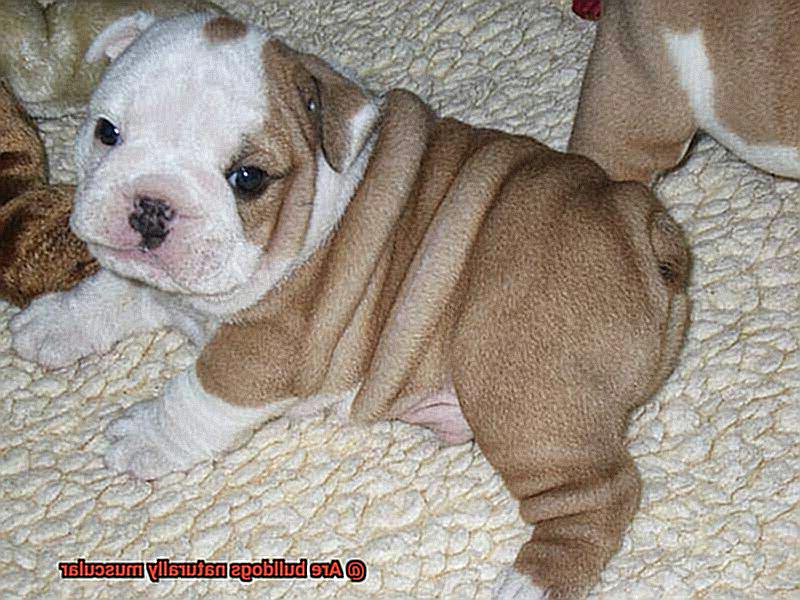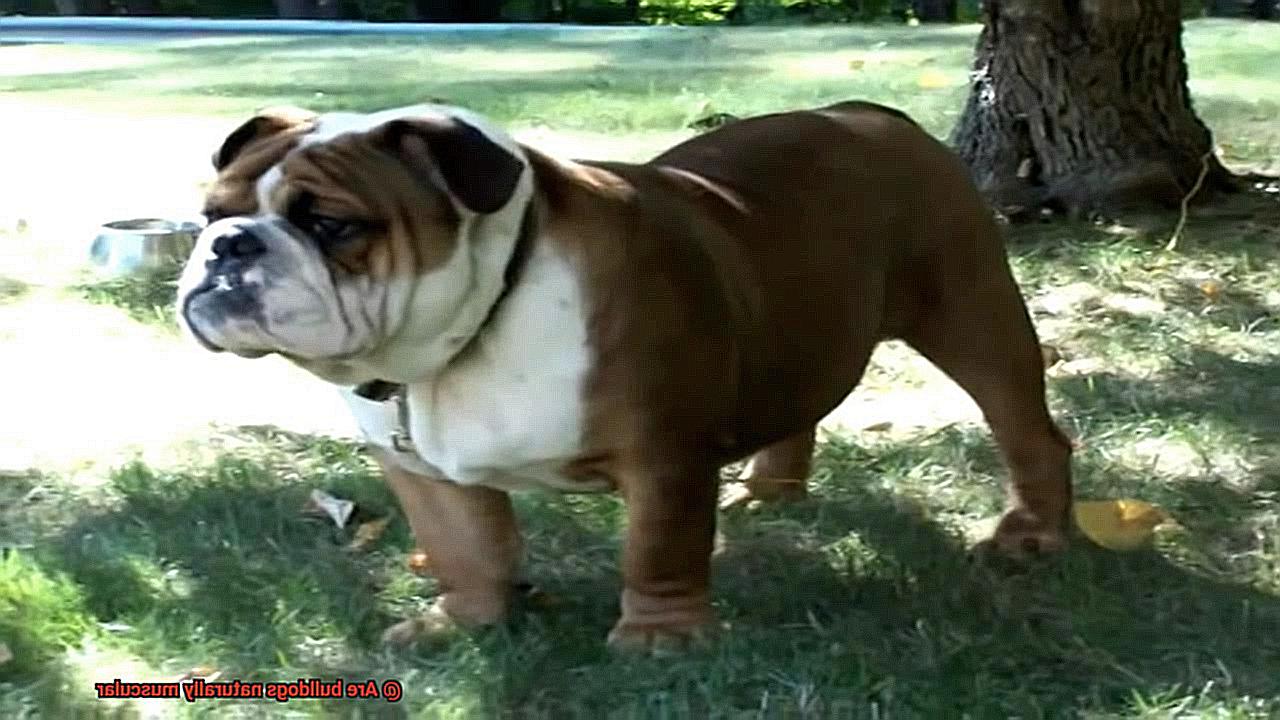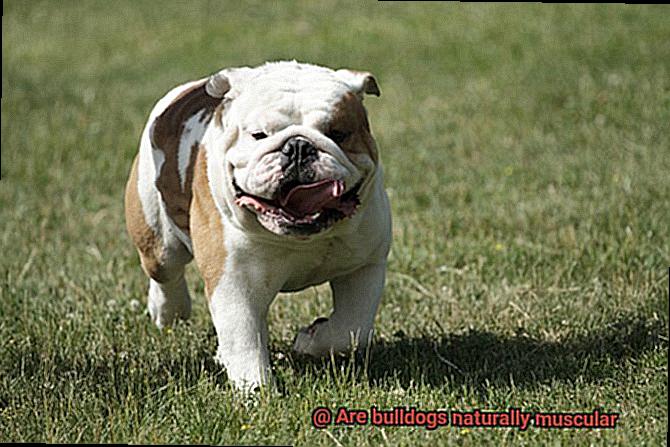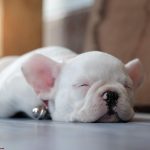Are bulldogs naturally muscular?
Welcome to our blog post all about Bulldogs and their jaw-dropping muscles.
If you’re a fan of these adorable and one-of-a-kind dogs, you’ve surely marveled at their robust build and powerhouse physique. But let’s get real for a moment: have you ever wondered if Bulldogs are born with biceps of steel?
Well, my friend, you’ve stumbled upon the perfect place to uncover the truth. In this article, we’ll dig deep into the genetic makeup and unique traits that contribute to a Bulldog’s naturally ripped appearance.
And hey, we can’t forget about the crucial role of exercise and diet in maintaining those bulging muscles. So whether you’re already a proud owner, contemplating adopting one of these muscle-bound beauties, or simply curious about the secrets behind their strength, buckle up as we embark on an exhilarating journey into the world of Bulldogs and their naturally muscular physiques.
Get ready to be amazed.
How Does Genetics Contribute to a Bulldog’s Muscularity?
Contents
- 1 How Does Genetics Contribute to a Bulldog’s Muscularity?
- 2 The Impact of Diet on Bulldog Muscles
- 3 Exercise and Muscle Development in Bulldogs
- 4 Breeding Practices and Their Effect on Bulldog Musculature
- 5 Are Bulldogs Considered Athletic?
- 6 Proper Nutrition for Promoting Muscle Development in Bulldogs
- 7 Consulting a Veterinarian or Breed Expert for Assessing Muscle Development
- 8 Potential Health Issues from Excessive Muscularity in Bulldogs
- 9 Conclusion
If you’ve ever wondered why your furry companion has such a muscular physique, you’re in the right place. In this article, we’ll explore how genetics contribute to a Bulldog’s muscularity and what factors influence their brawny appearance. So, let’s dive right in.
Genetic Predisposition:
Bulldogs owe their muscularity to their genetic makeup. Selective breeding practices have played a significant role in shaping their strong physique. Breeders carefully choose dogs with desirable muscular traits as breeding stock, ensuring that these traits are passed down through generations. This genetic predisposition helps define the Bulldog’s muscularity.
The Role of the Myostatin Gene:
One gene that influences a Bulldog’s muscularity is the myostatin gene. Myostatin is a protein that regulates muscle growth and development in mammals, including dogs. Bulldogs with mutations in the myostatin gene tend to have increased muscle mass due to reduced inhibitory effects on muscle growth. This genetic variation can result in a more pronounced muscular appearance in certain individuals.
Body Type and Metabolism:
Bulldogs possess a mesomorphic body structure, meaning they naturally have a higher proportion of muscle mass compared to other body types. Their short stature and compact build contribute to their naturally muscular appearance. Additionally, their genetic makeup can influence their metabolism and energy expenditure. Some Bulldogs may have a higher metabolic rate or increased muscle fiber composition, which contributes to their overall muscularity.
Environmental Factors:
While genetics play a significant role, environmental factors such as diet, exercise, and overall health also contribute to a Bulldog’s muscular development. Providing proper nutrition, regular exercise, and adequate rest are essential for maintaining and enhancing their muscle growth.
Conclusion:
In conclusion, Bulldogs owe their muscularity to a combination of genetic predisposition, body type, and metabolic factors. Selective breeding practices and specific genes, like the myostatin gene, influence their muscle mass and overall physique. However, it’s crucial to provide proper care, including a balanced diet and regular exercise, to support their muscular development. Remember, every Bulldog is unique, so embrace their brawn and keep them healthy and fit.
The Impact of Diet on Bulldog Muscles
Here, we’ll explore the impact of diet on bulldog muscles and uncover the secrets to maintaining their brawny physiques. So grab a treat and let’s dive in.
- Protein Power: Bulldogs need protein to build and repair their muscles. Opt for lean meats like chicken, turkey, and beef, as well as fish and eggs. These protein-packed options will give your furry friend the fuel they need to flex those muscles.
- Carb-o-Load: Carbohydrates provide the energy bulldogs need for their active lifestyles. Incorporate whole grains like brown rice and quinoa into their diet, along with nutrient-rich vegetables such as sweet potatoes and peas. These carbs will keep their muscles fueled during playtime and exercise.
- Fat Matters: Don’t be afraid of fats. Healthy fats, like omega-3 fatty acids found in salmon and flaxseed, are essential for reducing inflammation and supporting muscle health. So go ahead and add a little fat to your bulldog’s diet to keep those muscles in tip-top shape.
- Hydration Station: Proper hydration is crucial for muscle function. Always make sure your bulldog has access to clean, fresh water. Dehydration can lead to muscle cramps and fatigue, so keep those water bowls filled.
- Quality over Quantity: Avoid feeding your bulldog excessive amounts of processed or low-quality foods. These can cause weight gain, which can negatively impact muscle health. Stick to high-quality, balanced meals that meet their nutritional needs.
- Portion Control: Just like humans, portion control is key for maintaining a healthy weight and muscle mass in bulldogs. Consult with a veterinarian or canine nutritionist to determine the appropriate portion sizes for your furry friend.
- Pump It Up: Diet alone isn’t enough to build muscle. Regular exercise is a must for bulldogs. Engage in activities like walks, playtime, and agility training to keep those muscles strong and toned.
Remember, genetics also play a role in bulldog muscle development. Some bulldogs are naturally more muscular due to their genetic makeup. However, by providing a balanced diet and regular exercise, you can optimize your pup’s muscle potential.
Exercise and Muscle Development in Bulldogs
In this comprehensive guide, we’ll explore the world of exercise and muscle development for French Bulldogs. From low-impact exercises to strength training techniques, we’ll cover it all. So, let’s dive in and get those muscles bulging.
Understanding Bulldogs’ Unique Build:
French Bulldogs may not be naturally muscular like some other breeds, but that doesn’t mean they can’t achieve a well-toned physique. Due to their compact and muscular build, intense exercise can be challenging for them. Consult with a veterinarian before starting any exercise routine to ensure your Frenchie’s safety.
Low-Impact Exercises:
To keep those joints and muscles happy, opt for low-impact exercises such as walking, swimming, and gentle play sessions. These activities help keep your Frenchie active without putting excessive strain on their bodies. Remember, regular exercise not only promotes muscle development but also helps maintain a healthy weight.
Short Bursts of Activity:
Who says exercise has to be boring? Break up your Frenchie’s exercise routine into multiple shorter walks spread throughout the day. This allows them to get enough exercise without getting exhausted or overheated. Plus, it keeps things interesting for both of you.
Strength Training:

Ready to take things up a notch? Incorporate strength training exercises into your Frenchie’s routine. Start slowly and gradually increase the intensity. Exercises like sit-to-stand or controlled stair climbing can help strengthen their leg muscles. You can also use toys or treat puzzles that require physical effort to stimulate their muscles while providing mental stimulation.
Listen to Your Frenchie:
Remember, Bulldogs have unique anatomy and may tire more easily. Keep a close eye on their energy levels during exercise and adjust accordingly. If your Frenchie shows signs of fatigue or discomfort, it’s best to stop and allow them to rest. Their safety and well-being should always come first.
Breeding Practices and Their Effect on Bulldog Musculature
In this blog post, we will delve into the world of bulldog breeding practices and explore their influence on muscle development. Let’s get started.
Breeding Practices and Musculature:
The Evolution of Breeding:
- Initially bred for strength and tenacity, bulldogs had a natural muscular build.
- With increasing popularity as companion dogs, breeding practices shifted towards achieving specific appearances rather than functional athleticism.
Inbreeding and Line-breeding:
- Inbreeding or line-breeding involves mating closely related dogs to maintain desired traits.
- While this can preserve certain physical characteristics, it may lead to a loss of genetic diversity and increase the risk of musculoskeletal problems.
Selection for Extreme Features:
- Breeders often prioritize extreme and exaggerated features like heavily wrinkled faces or excessively broad chests.
- These traits may be visually appealing but can compromise muscle development and overall physical health.
Coat Color and Pattern Influence:
- Breeding for specific coat colors or patterns can indirectly impact bulldog musculature.
- When breeders prioritize coat variations over other traits, they may neglect maintaining optimal muscle tone and strength.
The Rise of Irresponsible Breeding:
Puppy Mills and Substandard Care:
- Irresponsible breeding practices in puppy mills prioritize profit over dog welfare.
- Substandard care and inadequate genetic screening can compromise bulldog musculature.
Choosing Responsible Breeders:
- Research breeders carefully to ensure they prioritize health and well-being.
- Responsible breeders conduct proper health screenings, avoid excessive inbreeding, and focus on producing physically sound puppies.
Are Bulldogs Considered Athletic?
When it comes to athleticism, bulldogs are not typically the first breed that springs to mind. Their stocky build and short-nosed face are not conducive to intense physical activity.
As a bulldog owner myself, I have firsthand experience with their limited athletic abilities. Let’s delve deeper into why bulldogs are not considered highly athletic.
Breathing Difficulties:

One of the main reasons bulldogs are not known for their athleticism is their brachycephalic (short-nosed) face. This facial structure often leads to breathing difficulties, making it challenging for them to engage in strenuous exercise. The shortened airways restrict airflow, making it harder for bulldogs to breathe during intense physical activity.
Moderate Energy Level:
While bulldogs may not excel in activities that require speed or endurance, they do have a moderate energy level. They enjoy short bursts of activity, such as playing fetch or going for leisurely walks. These activities can help keep them physically active and mentally stimulated without overexerting themselves.
Low-Impact Exercises:
Although bulldogs may not be the best candidates for high-impact exercises, they can still participate in low-impact activities like swimming or agility training. These exercises provide a good workout while minimizing stress on their joints and respiratory system.
Individual Variations:
It is important to remember that each bulldog is unique, and some individuals may be more athletic than others. Proper training, diet, and regular exercise can help improve their fitness levels. However, it is crucial not to push them too hard or expect them to perform at the level of more naturally athletic breeds.
Heat Sensitivity:
Bulldogs are more prone to heat exhaustion due to their brachycephalic features. Overheating can lead to respiratory distress and other health complications. It is vital to provide them with plenty of water and shade during outdoor activities, especially in hot weather.
Proper Nutrition for Promoting Muscle Development in Bulldogs
French Bulldogs may be small in size, but they have big personalities and even bigger hearts. While they may not be naturally muscular dogs, with the right nutrition and exercise, you can help your Frenchie develop lean and strong muscles that will have heads turning at the dog park.
In this article, we’ll dive into the key factors of promoting muscle development in Bulldogs, specifically targeting our beloved Frenchies.
Fuel those Muscles with a Balanced Diet
To kickstart your Frenchie’s muscle-building journey, it’s essential to provide them with a balanced and nutritious diet. Opt for high-quality lean protein sources like chicken, turkey, and fish to support muscle growth without adding unnecessary fat. Pair this with carbohydrates from whole grains and vegetables to provide the energy needed for those bulging biceps.
Vitamins and Minerals for Supercharged Muscles
Just like humans, Bulldogs need their vitamins and minerals to thrive. Make sure your Frenchie gets a daily dose of fruits and vegetables to supplement their diet with essential nutrients like vitamin C, vitamin E, and potassium. These powerhouses aid in muscle repair and recovery after exercise, ensuring your Frenchie stays ripped and ready for action.
Portion Control: The Secret to a Lean Frame
Watch those portion sizes. Bulldogs have a knack for overeating, which can lead to weight gain instead of muscle development. Consult with a veterinarian or canine nutritionist to determine the appropriate portion sizes based on your Frenchie’s age, weight, and activity level. Remember, it’s all about quality over quantity when it comes to building those rock-hard muscles.
Pump Iron (or something similar)
Exercise is a vital component of muscle development in Bulldogs. Start with low-intensity exercises like brisk walks or gentle jogs to get those muscles warmed up. Gradually increase the intensity to avoid strain or injury. And don’t forget to mix it up with some resistance training. Climbing stairs or using specially designed dog-friendly weight vests can help your Frenchie build muscle and turn heads during their daily strut.
Hydration Station: Quench those Muscles
Hydration is often overlooked but plays a significant role in muscle development. Make sure your Frenchie has access to fresh water at all times, especially during and after exercise. This helps maintain optimal muscle function and aids in the recovery process, ensuring those muscles stay hydrated and ready for action.
Monitor, Track, and Celebrate Progress
Keep an eye on your Frenchie’s progress regularly. Track their weight, body condition, and muscle tone to ensure they’re on the right path to muscular greatness. If you have any concerns or notice significant changes, don’t hesitate to consult with a veterinarian. They can provide guidance tailored to your Frenchie’s specific needs, helping them achieve their muscle-building goals.
Consulting a Veterinarian or Breed Expert for Assessing Muscle Development
French Bulldogs, with their compact and muscular build, are known for their unique physique. Assessing their muscle development is crucial for ensuring their overall health and well-being. In this article, we will explore the importance of consulting a veterinarian or breed expert when evaluating the muscle development of French Bulldogs.
Veterinary Expertise:
Veterinarians are trained professionals who can evaluate the overall physical condition of your French Bulldog. They possess the knowledge and skills to assess muscle tone, identify weaknesses, atrophy, or imbalances, and recommend appropriate diagnostic tests if necessary. Their expertise in canine anatomy and physiology allows them to provide valuable insights into your bulldog’s muscle development.
Breed Experts’ Insights:
Breed experts affiliated with kennel clubs or breed-specific organizations possess in-depth knowledge about French Bulldogs’ breed standards. They can offer guidance on what is considered typical for a muscular bulldog and provide specific recommendations for promoting healthy muscle development. Their expertise can help you set realistic goals and expectations for your dog’s physique.
Exercise and Nutrition:
Both veterinarians and breed experts can offer advice on exercise routines, training techniques, and nutrition that support healthy muscle growth.
They understand the unique needs of French Bulldogs and can recommend appropriate exercises to strengthen specific muscle groups without risking injury or strain.
Additionally, they can guide you in selecting a balanced diet that provides essential nutrients for optimal muscle development.
Genetic Factors:
Consulting with professionals allows you to share accurate information about your French Bulldog’s background, including its pedigree and any previous health issues. This information helps in assessing whether genetic factors may be influencing your dog’s muscle development. By understanding these factors, veterinarians and breed experts can tailor their recommendations to address any potential concerns.
Potential Health Issues from Excessive Muscularity in Bulldogs
We all adore our furry friends with their adorable squishy faces and muscular builds. However, did you know that excessive muscularity in Bulldogs can pose potential health risks? In this article, we will explore the potential health issues associated with bulging biceps and provide insights on how to strike a balance between a strong physique and overall well-being for your beloved Bulldogs.
Joint Problems:
Bulldogs are already prone to joint issues such as hip dysplasia and luxating patellas. Excessive muscle mass can exacerbate these conditions, placing added strain on the joints. This can lead to pain, discomfort, and decreased mobility for your pup.
Respiratory Problems:
As brachycephalic breeds, Bulldogs already struggle with breathing due to their shortened skull and pushed-in face. Too much muscle mass can further restrict their airways, making it even more challenging for them to breathe properly. This can result in breathing difficulties, snorting, and respiratory distress.
Overheating:
Bulldogs are notorious for their poor heat regulation due to their shortened snouts. Excessive muscle mass increases internal heat production, making them more susceptible to overheating, especially in hot and humid climates. Heat exhaustion or heat stroke can be life-threatening for Bulldogs with excessive muscularity.
Skin Problems:
The folds of skin that Bulldogs possess can become more pronounced with increased muscle mass. These crevices provide a perfect breeding ground for dirt, moisture, and bacteria, leading to skin infections, irritation, and dermatitis.
Difficulty in Giving Birth:
Excessive muscularity in Bulldogs can make natural childbirth challenging for both the mother and her puppies. The increased muscle mass can narrow the birth canal, potentially resulting in complications during labor. In some cases, a cesarean section may be necessary to ensure a safe delivery.
Maintaining a Healthy Balance:
To keep your Bulldog healthy and muscular without risking their well-being, it’s crucial to strike a balance. Here are a few tips:
- Regular exercise: Engage your Bulldog in low-impact activities that promote muscle tone and strength without putting excessive strain on their joints.
- Balanced diet: Provide a well-balanced diet that meets your Bulldog’s nutritional needs without promoting excessive muscle growth.
- Monitor weight and muscle development: Keep a close eye on your Bulldog’s weight and muscle development. Consult with your veterinarian if you notice any concerns or imbalances.
Conclusion
In conclusion, it is evident that bulldogs possess a natural propensity for muscularity.
Their sturdy build and prominent muscles are not the result of excessive exercise or specialized training, but rather a genetic predisposition. Bulldogs are born with a unique physique that showcases their inherent strength and power.
From their broad shoulders to their thick necks and robust hindquarters, every aspect of their anatomy exudes muscularity. It is this distinctive physicality that sets them apart from other breeds and makes them so visually striking.
Whether they are playfully bounding across the yard or simply lounging in repose, bulldogs effortlessly exhibit their natural muscularity.




